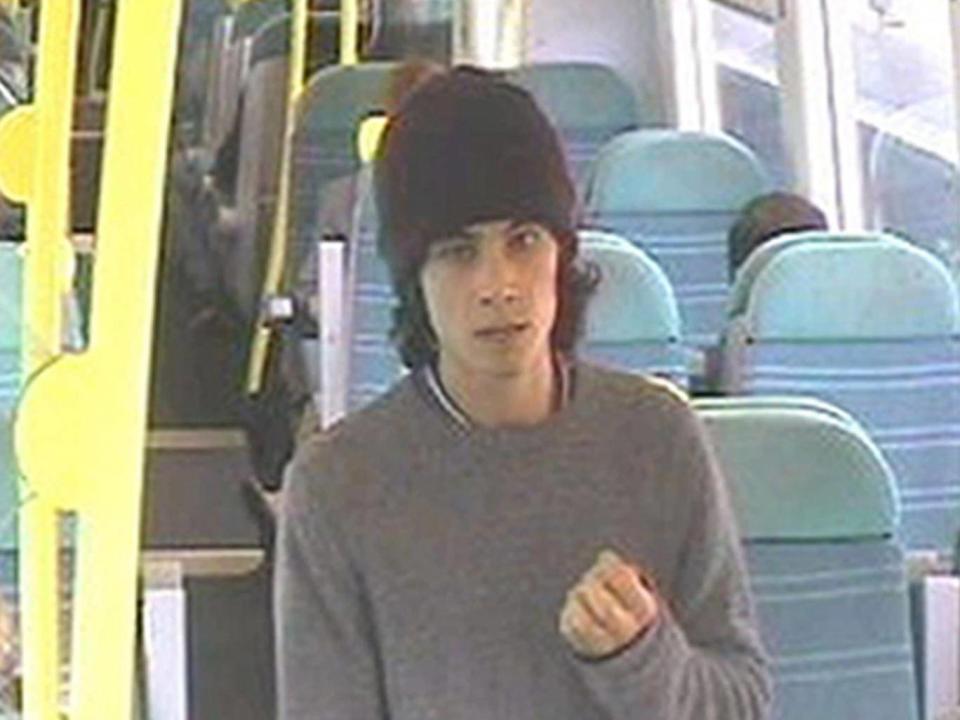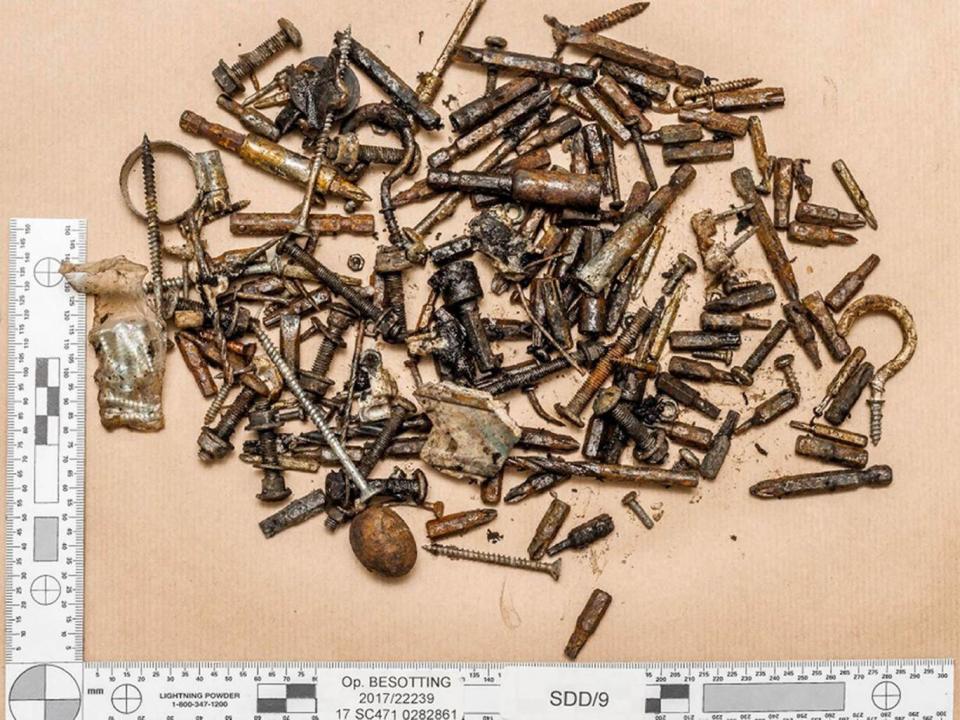Parsons Green attack: The ‘bored’ Iraqi asylum seeker who launched terror attack on country that offered him sanctuary
“Bored, bored, bored, bored, bored, bored, bored.” Those were the words scrawled by an Iraqi teenager who detonated a bomb that could have killed dozens of commuters on the London Underground.
A gifted student, action film fanatic, troubled teenager, orphan, asylum seeker, terrorist – Ahmed Hassan showed many faces to the people whose lives he affected after arriving in the UK.
But investigators still struggle to understand what drove him to build a bomb, load it with deadly shrapnel and leave it to detonate in a packed Tube carriage on 15 September.
Even after Hassan was convicted of attempted murder and explosives offences at the Old Bailey, prosecutors admitted he “never provided a clear motive for the attack”.
The teenager, who used a £20 Amazon voucher he won for being “student of the year” to buy the necessary chemicals, claimed he never wanted the bomb to explode and was merely acting out his fantasy of being a fugitive.
Hassan told the court he dreamed of being the next David Attenborough, but became obsessed with a “fugitive” fantasy after watching action films during the summer holidays to pass the time.
Tom Cruise‘s Mission: Impossible series were a particular inspiration, he told a psychologist.
But prosecutors said he was moved by “anger and hatred” about his parents’ death in the Iraq war, which he blamed on both America and its British ally.

He faces life imprisonment when he is sentenced next Friday, when a judge will have the power to increase the jail term because his crimes had a “terrorist connection”.
Isis claimed responsibility for the bombing that shocked Britain on 15 September, following a wave of terror attacks in Westminster, Manchester, London Bridge and Finsbury Park.
A lecturer at Brooklands College in Surrey said she saw a message on his phone saying “IS has accepted your donation” in 2016, while a Barnardo’s worker helping Hassan as a child asylum seeker overheard him listening to an Arabic “call to arms” song, and another official saw the teenager watching a video that included Isis flags.
He was referred to the Government’s Prevent counter-extremism programme twice by social services and a teacher, but police said the “devious” teenager appeared to engage with the project while secretly plotting the terror attack.
Hassan was flagged as a potential risk just days after being interviewed by social services in January 2016, three months after he arrived in Britain in the back of a lorry from Calais.
Then 16, he told immigration officials he was being forced to become an Isis child soldier in Iraq and had been “trained to kill” by the terrorist group.
But while giving evidence to the Old Bailey, Hassan said he actually had had no contact with Isis and lied because he wanted to claim asylum.
“Because I came from a wealthy, safe area in northern Iraq in Kurdistan and if I told the truth my only reason to leave the country was to further my studies – I felt I had to make up something strong,” Hassan told the court.

“In the Jungle in Calais people used to talk about these things and make up stories. I never came across a refugee who said he would tell the truth when he arrived in the country.”
Hassan told officials both his parents had died in Baghdad. He was too young to remember his mother, who may have been shot dead during the Iraq war, while his taxi driver father died in an explosion when he was seven years old.
He moved to northern Iraq with his uncle and older brother, working from the age of 12 to ferry goods across the border with Iran before deciding to leave his home country entirely for a “better life”.
“I wanted studying, I wanted to learn English and there was so much pressure on me to keep on with my job,” Hassan told the court, telling how he crossed into Turkey and travelled onwards to Italy but left because authorities “were not very nice”.
He travelled from there to Paris, then the Jungle camp in Calais, before smuggling himself to Britain by train and then onto a lorry when he was 16.
Prosecutors said his parents’ deaths had fomented “anger and hatred” against the West, which came to fruition in the country that offered him sanctuary.
Hassan told his college mentor Katie Cable that it was his “duty to hate Britain”, and expressed anger at Tony Blair and the Iraq war.
“This is a very calculated act of anger, something you planned for some time,” said prosecutor Alison Morgan.
“You were given a safe haven to live in this country. You were given a home and an education and you felt guilty about that, didn’t you?
“You felt guilty that you had let down people in Iraq by coming here and accepting a safe haven in the country that you held responsible for your father’s death.”
Hassan denied the accusations and claimed he built the bomb at his foster parents’ home in Sunbury-on-Thames for “attention”.
He only expressed anger about British involvement in Iraq so people would not see him as a coward, he claimed, and did not blame anyone for his father’s death.
Hassan described himself as religious, praying five times a day, and “very clever” – having been the top pupil at his school in Iraq for six years in a row.
But the court heard that the teenager was secretive, had self-harmed and had contemplated suicide.
At college he was known to be shy but chatted to classmates about Godzilla, Trainspotting, his love of horror films, sport and football.
Yahyah Farroukh, a man previously fostered by the same couple, who was wrongly named as a suspect, said Hassan was isolated but was “constantly on the phone” to unnamed friends.
“It was impossible for anybody to know about his life because he was so private,” he added.
Hassan had once gone to Wales to visit “a friend“ but told no one where he was going, he said, while teachers told how he would receive phone calls and leave class without giving a reason.
The teenager claimed the huge volume of calls he took daily were down to his sideline business selling phones on Gumtree, earning him around £100 a week.

When Mr Farroukh visited his foster home, where he had himself previously lived, on 3 September he found Hassan’s bedroom door was broken and had the word “bored” scrawled over it.
The younger man told him he was “tired and bored”, while Penny and Ron Jones were on holiday in Blackpool over the summer.
Asked why he decided to make a bomb during this period, Hassan told jurors: “I was very bored, very stressed, very confused and I watched lots of movies, action movies during that time.
“It became kind of a fantasy in my head. I was thinking about it. Yes, that was it.
“I was watching documentaries as well, about fugitives and just the idea of being a fugitive got into my head. And I thought about it and that was it.”
Hassan admitted making triacetone triperoxide (TATP) – a sensitive explosive known as the Mother of Satan that has become a trademark of Isis terror attacks around the world.
But he claimed he tested it at home to ensure it did not explode, and only wanted the device to “burn”.
“The idea of killing another human being never crossed my mind at all, never in my life,” Hassan said, claiming he was frightened after the bombing and wanted to return to his home country.
But prosecutors said he was “calm” as he disposed of his mobile phone, checked the news headlines and changed his clothes en route to Dover, where he was picked up by police the following morning.
They questioned why, if the attack was a hoax, Hassan needed to build a bomb containing 400g of TATP and packed with 2.2kg of metal shrapnel including sockets, screws, bolts, nails, knives and screwdrivers.
Experts testified that the bomb was a viable explosive device, and Ms Morgan concluded: “It is a matter of luck that there was not a full explosion that day, not because of any deliberate intention on the part of the defendant to cause just a fire.”

Analysts previously told The Independent that if the bomb exploded fully it could have killed or injured all 93 people in the carriage, and possibly more.
But the device was faulty – possibly because it had been disturbed as Hassan carried it to the Tube in a Lidl bag, before setting a timer in a railway station toilet and planting the bomb among commuters.
CCTV showed Hassan standing next to the package for four stops, as the train got busier and busier on its rush-hour journey into central London, then disembarking two minutes before it detonated.
He refused to watch footage of a huge fireball engulfing the carriage, seeing 50 people injured by the flames and the ensuing stampede to escape Parsons Green station.
“I wish I could travel back in time and stop it at once but that’s not possible – I’m very sorry but it can’t be done,” Hassan told jurors. “Because I myself have mental scars and I know how hard it is.”
He claimed he felt bad for the “people who have supported me in this country and cared about me”, amid concern about how the threat he posed was missed.
Gail Walker, principal of Brooklands College in Weybridge, said staff had noticed a “change in his behaviour” and reported it to Prevent.
Commander Dean Haydon, head of Scotland Yard’s counter-terrorism command, called Hassan “devious and cunning in equal measures” and suggested he fooled specialist officers.
“On the one hand he was appearing to engage with the Prevent programme, but he kept secret what he was planning and plotting so we describe him as a lone actor,” he added.
“All the partners involved are committed to working through and implementing any necessary recommendations.”
The Home Office announced that police and Surrey council were conducting a review into how Hassan slipped through the net.
“Clearly there were opportunities missed, from what we’ve heard, and that is very worrying,” said Surrey Police and Crime Commissioner David Munro.
He added: ”As far as Surrey is concerned, it is obvious we were too slow – all the organisations involved.
“Since the Parsons Green bombing we’ve conducted collaboratively an urgent review, with the County Council, Surrey Police, counter-terrorism, and I truly believe that we have learnt lessons, but we must never stop there. It just shows what a knife-edge we are on.”

 Yahoo News
Yahoo News 
